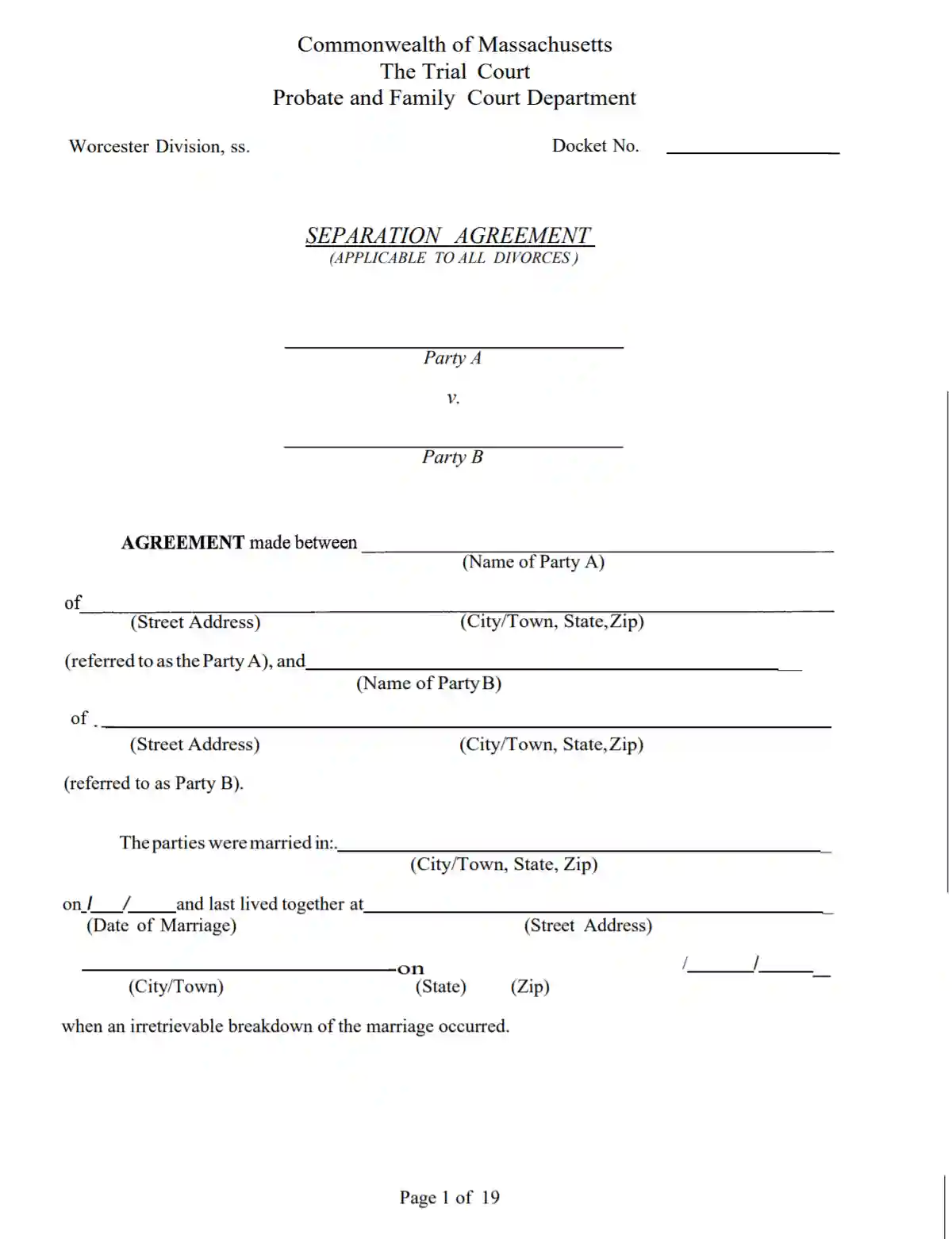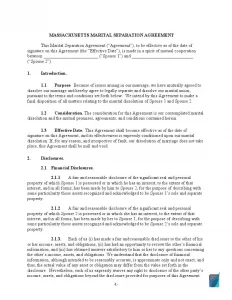Massachusetts Marital Settlement (Divorce) Agreement and Legal Separation
When people get married in Massachusetts (or any other place in the world), they hope that their marriage will last happily forever. But in many cases, they face a need to get divorced, and the Massachusetts marital settlement agreement is a document that both partners have to discuss and create in such a case.
This legal form sets the rules for the period that comes after marriage termination—what will happen to the properties and debts of both ex-spouses, financial support, and details about child care. Learn more about it in our comprehensive guide.
Once the partners agree on the terms and sign the marital settlement agreement, they should not break the rules because there are consequences. For instance, a parent responsible for kids’ fostering may forfeit such rights if breaching the agreement or misbehaving.

Build Your Document
Answer a few simple questions to make your document in minutes
Save and Print
Save progress and finish on any device, download and print anytime
Sign and Use
Your valid, lawyer-approved document is ready
Spouses can lack mutual understanding, leading to endless fighting and the impossibility to negotiate the agreement’s conditions and provisions. For such cases, mediators exist. These professionals assist couples in setting the rules for the agreement if spouses cannot interact appropriately.
There is no way you can get divorced without the agreement. Both partners should sign the form, and it should be notarized. The template is lengthy and requires various attachments. Let’s see the standard structure of the marital settlement agreement in the United States:
- Basic information about spouses and the marriage. The partners’ names should appear on the first page. The dates of marriage and separation should then follow. If one of the partners is in the military, they should state so in the agreement. The couple should also reveal if they have children or not.
- Details about the couple’s estate and spouse’s support. Some partners support their spouses by sending money after the divorce. If this is the case, signatories should describe the details and the amount to send monthly. Each partner should also list their assets and debts. Insurance matters are also covered in this section, along with partners’ desire to change their names.
- A section with various terms. Signatories are allowed to add any conditions they want in the form.
- Parties’ signatures. When the agreement is ready, both parties should append their signatures and write their names and signing date.
- Add-ons. There is a set of attachments required for each marital settlement agreement—these add-ons detail the rules regarding the couple’s minor child’s fostering. If the wife is pregnant during the divorce procedure, conditions for the child to be born should be added.
Among the provisions, one can find everything tied to custody, for instance, the visitations schedule for a parent who will not live with the child and the amount of money sent for the support monthly.
Besides child care, spouses have to complete other supplements that indicate the liabilities, properties, and spousal support where applicable.
Although we have given you a structure for such legal forms, you might still be unsure about your template. Use our form-building software to generate the proper Massachusetts marital settlement agreement form.
When creating a marital settlement agreement and filing for a divorce in Massachusetts, you should act in line with the local laws. Regulations for divorces and separation are different in American states. Keep reading to discover what laws are in force in Massachusetts.
Massachusetts Divorce and Separation Laws
Chapter 208 (Part 2, Title 3) of the Massachusetts General Laws is called “Divorce” and contains information about the related procedures. You will find everything you should know about the divorce process in the state there.
Grounds for Divorce
The mentioned chapter begins with sections that outline valid causes for divorce in Massachusetts (from Section 1 to Section 5 inclusively).
Among the substantial grounds are the following:
- Alcohol or drug addiction
- Impotence
- Cheating, abandonment of the other spouse for at least a year
- Unsupportive behavior and unsolvable arguments
Property Division
The procedure is outlined in Section 34. The judge can decide how to share the couple’s assets equitably.
The court considers a set of aspects when splitting the properties:
- Partners’ ages
- Earnings
- Health state
- Job
- The duration of the marriage
- The need for the child to get financial support
Child Custody and Visitation
According to Section 28, one of the parents becomes the main caretaker based on various factors such as the child’s interests and parents’ income. Section 19 obliges the court to act in line with what is best for the child.
Sections 31 and 31A are also related to custody and visits. They define shared and sole custody and describe the lawful conditions.
Child Support and Alimony
Section 28A allows the court to choose who among the parents will be responsible for temporary custody and support while the divorce processes are in progress. Section 28 includes provisions tied to the theme as well. Here are the factors to take into account:
- Financial position
- Provisions of a marital agreement or a document that details the amount of child support
- Support from other relatives
- Debts from the marriage for the child’s benefit
- Substantial capital gains
- The child’s independent financial resources
- Custody arrangements and cost of travel for visitation purposes
Popular Local Marital Settlement Agreement Forms
It’s advisable to specify the terms of a divorce before the court hearing by using a divorce settlement agreement that deals with a number of issues. Below are some of the most commonly searched templates for marital settlement by state.
Legal Separation
If you and your spouse have problems with your marriage but are still unsure about the need to divorce or have other reasons to remain married, you can split up and live apart. In many American states, this is called “legal separation.” You have to file forms in court to get permission for this status. You will still be a wife and a husband, but you will not have to live together anymore.
However, the Massachusetts law does not regulate this kind of break-up. You and your partner can start living separately without any filings. However, you should create a Separation Agreement to ensure that you have commitments regarding support and kids.
There are generally two ways to divorce:
- Divorce from bed and board. It happens if one of the spouses is at fault and there is a one-year waiting period.
- None-fault divorce. This occurs by mutual consent or if it is a traditional divorce. For it to occur, the spouses must have lived apart for at least one year—six months if there are no minors involved—and a settlement agreement is concluded.
Before you end your marriage, think twice, and sum up all pros and cons that will follow. A divorce is an unpleasant process, even if you and your spouse break up on good terms. If you have a child, it can be even more stressful for the whole family.
If you have thought about the divorce thoroughly and feel that it is inevitable, proceed to the next part to learn how to file for divorce in Massachusetts step-by-step.

Filing for Divorce in Massachusetts
In Massachusetts, applications for divorce are accepted in the Probate and Family Court in your area of residence. The fee you should pay for the process completion is $215, and the waiting period is at least three months. See the guidelines on the application filing below.
1. Prepare and Sign Various Records
If you are ready to get divorced, there is a lot of paperwork to do. Besides the marital separation agreement that we have described above, both spouses should complete and sign the “Joint Petition for Divorce” template, the form R-408, and the “Affidavit of Irretrievable Breakdown” form. These documents describe the parties and the reasons for their official marriage termination.
2. Disclose Your Finances
Each spouse has to create a Financial Statement describing their assets and income. Pick a “short” form if your annual income does not exceed $75,000. If the income is higher, fill out a “long” form. These statements should be notarized.
3. Apply to the Court
After creating all the required documents, send them to the court in your county. Here, you are required to pay the fee mentioned above. Besides the set of papers, add a copy of your marriage certificate.
4. Complete Templates Related to Your Kids (If There Are Any)
If you do not have kids, proceed to the next step.
If you have at least one kid, additional papers are needed. For example, the Affidavit Disclosing Care or Custody Proceeding template is compulsory. Consult the court clerk to determine templates that suit your case.
In Massachusetts, spouses should attend the state education program for parents if they get divorced. You can skip this requirement by filling out the form CJD 444 if you have valid reasons.
When you have filled out the needed templates, submit them to the court.
5. Wait for the Hearing
You will receive a notification about the hearing within 30 days after filing all papers. If one of the spouses does not want to attend the hearing, they can consult with the clerk and complete a specific form.
6. Attend the Hearing
Visit the court on the day indicated in the notification. It is recommended that both spouses attend the hearing because the judge will question both partners.
These questions are about your marriage, relationship, work, assets, children, and other family peculiarities. The answers you give will help the judge to make a fair decision. The spouses must prove that their argument is unsolvable, and they really have to get divorced.
It takes three or four months to get the final decision and the divorce certificate. If one spouse wishes to change their name, they can do so when the divorce process is complete.

Try our maker to customize any template available on FormsPal to your needs. Here’s a number of some other popular Massachusetts forms we offer.
Other Marital Settlement Agreement Forms by State